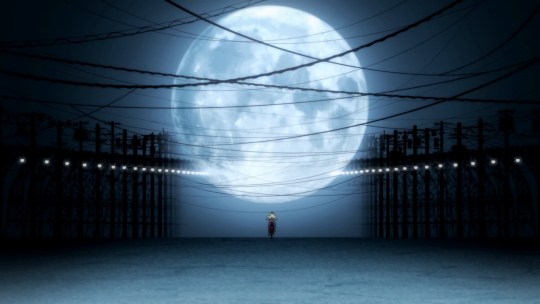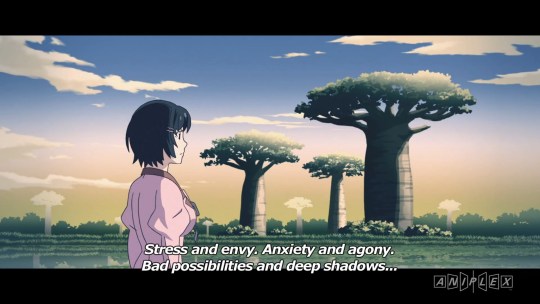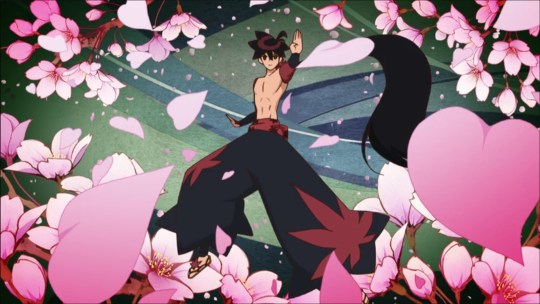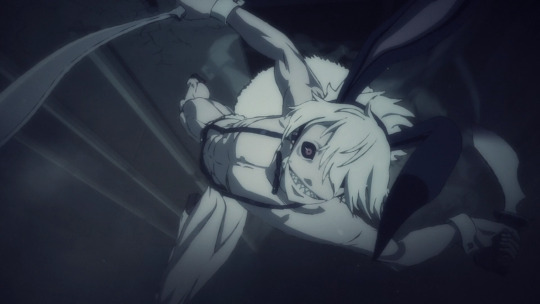#even with shichika who’s basically the center of the story
Text
I watched katanagatari again. fucked up
#khytal.ks#bittersweet ending but a pretty solid one nonetheless#I like that it really is about the swords. I mean obviously it’s in the name but#there are no real attachments to any of the characters#you don’t exactly get a chance to get attached (unless you’re predisposed to liking togame’s character which I am not)#even with shichika who’s basically the center of the story#by the time you realize his significance beyond being togame’s…..assistant#it’s already nearly the end#and then that’s it#idk it’s like reading folklore#it’s definitely unique among the other shows I’ve seen#I watched it a while ago but I remembered it the other day and wanted to see it again now that I’m older x’)
9 notes
·
View notes
Text
FEATURE: What Makes Nisio Isin's Work So Special?

Hello everyone, and welcome back to Why It Works. You all ready for the spring anime season? I know I’m certainly ready to shake off the winter snow and settle in for some new productions — and among those productions, I’ve got a few in particular that seem right up my alley. Along with obvious sequels like My Hero Academia and MEGALOBOX, I’ve also got my eye on the cheekily titled Pretty Boy Detective Club. To tell you the truth, I couldn’t tell you the first thing about Detective Club itself — but I have learned an awful lot about its author, Nisio Isin.

Nisio Isin’s writing was actually one of the first things that really captivated me about anime when I was getting back into the medium a decade ago. In a medium that’s generally defined by its visual storytelling, Isin’s works offered a lyricism of prose, complexity of characterization, and ambition of thematic intent that really stood out to me. As someone whose journey through art started in traditional prose fiction, Isin’s work embodied what I love about novels as a medium, even while transposed into animation. He’s one of my favorite writers in the medium, and today I’d like to look back across his adapted properties and pin down what makes him so special!
Bakemonogatari was my first experience with Nisio Isin’s writing, and it frankly wasn’t the easiest watch. Bakemonogatari is challenging in a variety of ways — its protagonist seesaws between pathetic and perverted, its narratives frequently pause for an episode or two of circular banter, and its cinematography acts as a deliberate counterpoint to its dialogue, building meaning through the distance between its visual and textual content. But eventually, all of these investment speed bumps ended up revealing themselves as key facets of the show’s overall ambition.

Bakemonogatari dives deep into the ugliness of abuse, self-hatred, and depression, offering complexity and specificity of characterization like little else in the medium. The show consistently demonstrates characters at their weakest and worst, if only to emphatically declare that even the most broken among us are capable of joy and redemption. The vivid scars of Bakemonogatari’s characters, and the way Nisio Isin was able to extrapolate such rich psychologies and relationships from those scars, simply astounded me. Seemingly idle conversations would be built on massive hidden icebergs of emotional subtext, offering a feast for any fan of psychological dramas. And the show actually improves significantly over time, building up to the wild emotional crescendos of the second season and onward.
After being so impressed by the psychological and thematic richness of Bakemonogatari, I dove right back into Isin’s other then-recent adaptation: the 12 double-length episodes of Katanagatari. Katanagatari’s 12 episodes match up to the 12 months of the year and center on a warrior and strategist who are attempting to collect, you guessed it, 12 special swords. But Katanagatari’s structural congruity extends much further than that — in fact, I’d consider it one of the most “perfect” anime I’ve ever seen, in terms of its structural and thematic elegance.

Through its 12 episodes, Katanagatari charts a fantastical course through the end of the age of samurai, as the old weapons and older grudges of a past era make way for the relative peace of the new. Shichika, a man raised as a sword, must ally with Togame, a vengeance-driven strategist, in order to collect the heroic blades of the past age. Across their journey, Shichika offers a vivid portrait of an old soldier attempting to grow beyond his nature, while Togame simultaneously demonstrates the tragedy of clinging to the past. Meanwhile, the world around them turns in perfect unison with their growth, exploring the power of legacy and cruelty of time’s arrow across every conflict and character. Katanagatari possesses a holism of thematic intent like little art I’ve seen, and emphatically demonstrates Isin’s unique talent for making every aspect of a narrative reflect on every other aspect. It’s like a flawless little diamond, with each facet echoing the beauty of the others.
My praise so far might imply that Nisio Isin’s properties are more intellectual labor than entertainment, and to be honest, you wouldn’t be entirely off the mark. Fortunately, we’ve also received adaptations of some of his lighter works — like Juni Taisen, which is mostly just a bloody, boisterous good time. Even in the context of a zodiac-themed battle royale, Isin’s mastery of structure and character helps enliven the production and bring some finesse to the popcorn drama executions. You can bring intelligence, style, and ambition to even the most maligned genres, as Bakemonogatari’s “harem as treatise on youth alienation” concept attests. In JUNI TAISEN: ZODIAC WAR, he builds sympathetic characters in just a brief aside or two, only to have them killed off by a machete-wielding maniac in a bunny suit thong.

I’ve talked plenty about how Isin’s writing elevates the adaptations of his work — how his dialogue and characterization are best in class, meaning at least the scripts of all his shows are bound to be excellent. That said, his stories aren’t simply repositories of witty dialogue. Isin’s works are wordy and self-reflective, but all of that prose is ultimately working to capture a precise, resonant human sentiment. As such, his works can also simply serve as a fertile canvas of adaptation, even if you’re disposing of his line-by-line internal monologue. Great adapters are willing to make dramatic changes to works in order to adapt their fundamental spirit into the tools of a very different medium. And so it goes for Kizumonogatari, perhaps the greatest adaptation of any of Isin’s writing.
In Kizumonogatari, director Tatsuya Oishi worked with an absurdly talented team for years, in order to create a mixed CG/traditionally animated aesthetic that perfectly evokes the original text’s alienating emotional landscape. Oishi and his team took a story largely reliant on internal monologue and stripped out the internal voice entirely, recreating its effect through purely visual and aural means. That’s not to say the original text was wrong to include these monologues — rather, that the original’s prose successfully captured a specific mind space, and that Oishi’s brilliant collaborators were able to fully translate that mind space into an intense visual experience. Even if you strip the dialogue entirely, Isin’s writing offers a unique canvas for other talented creators to flourish.

For all of these reasons and more, Nisio Isin is my favorite writer working in the anime sphere. I’ve found at least something to enjoy in basically all of his works, and given how fundamental his poetic, character-rich scripting is to his works, I can’t imagine that’ll change anytime soon.
I hope you’ve enjoyed this exploration of Isin’s work, and let me know your own favorite Isin shows in the comments!

Nick Creamer has been writing about cartoons for too many years now and is always ready to cry about Madoka. You can find more of his work at his blog Wrong Every Time, or follow him on Twitter.
Do you love writing? Do you love anime? If you have an idea for a features story, pitch it to Crunchyroll Features!
By: Nick Creamer
1 note
·
View note
Text
FEATURE: 10 Best Anime to Watch on Valentine's Day
Happy Valentine’s Day, everyone! As perhaps the most unabashedly feast-or-famine holiday around, today is a time for either treasured memories with loved ones or maybe just a whole bunch of ice cream and TV marathons. Fortunately, whether you’re celebrating the season alone or together, there’s plenty of anime out there to help you get in the spirit, with lots of them already available right now on Crunchyroll. From first crushes to destined loves and flirty traveling companions, anime runs the gamut of romance, and today I’ll be offering just a few shows that represent the mushier side of drama. In no particular order, here are some romantic highlights to bring some warm fuzzies to your day!
1) Toradora
Okay, I said “no particular order,” but in truth I meant no particular order except for Toradora. Toradora stars the diminutive Taiga and mild-mannered Ryuuji, who wind up working together after each learns the other has a crush on their best friend. The chemistry between Ryuuji, Taiga, and each of their friends is consistent and endearing, and Toradora follows these charming characters through all manner of romantic adventures. Toradora is also blessed with perhaps the best sarcastic best friend character of all time - Ami Kawashima. Combining lovable characters, thoughtful dialogue, and high drama theatrics, Toradora is the full romantic package.
2) Spice and Wolf
While Toradora may star one of anime’s best romantic ensembles, Spice and Wolf might have the medium’s all-time romantic couple. Lawrence is a merchant in a vaguely medieval world, shipping raw materials for profit all across the land. Holo is a wolf god, a spirit abandoned by her believers who now seeks a voyage home. Together, the two of them trade snipes, sell goods, and generally make the most of their time on the road. Spice and Wolf is a rambling road trip with two very likable friends, a slow romance that truly embodies the importance of the journey.
3) Kyousogiga
Of course, romantic love isn’t the only kind of love worth celebrating. Kyousogiga does indeed have some romantic love (between a magical painter and a drawing of a rabbit!), but it’s also suffused with many other kinds of love - love of family, love of home, and love of the world itself. Starring three siblings suspended in a mystical version of Kyoto, and livened by the little sister they never knew, it’s a madcap story that spins from first romance to family breakdown and a final, difficult reunion. It’s a beautiful and creative story that embodies what love is all about.
4) My Love Story!!
But getting back to the strict romances, My Love Story!! offers something too few anime get to: a couple in an actual, committed relationship. Gentle giant Takeo ends up confessing to his crush Rinko within the first few episodes, and the rest of My Love Story!! involves the two of them and their friends exploring the actual hurdles of a young relationship. Starring a great cast and dangerously suffused with cuteness, My Love Story!! is basically a warm, lovey-dovey blanket to snuggle under.
5) White Album 2
Unfortunately, sometimes love isn’t quite that easy. White Album 2 falls at the far end of romances, centered on a love triangle that puts all three of its members through the emotional ringer. White Album 2 is defined by distinctly thoughtful characterization and brutal dramatic turns, as its protagonists Haruki, Kazusa, and Setsuna all grasp at happiness on the edge of young adulthood. Don’t worry if you haven’t seen the first White Album - this story’s entirely self-contained, offering a brutal dramatic package for anyone who’s ready for it.
6) Nana
Love doesn’t really get any easier when you leave high school, though. Starring two girls who share a name you can probably guess, Nana follows punk rocker Nana Osaki and starry-eyed Nana Komatsu as they seek fame, fortune, and romance in the often confusing adult world. Nana brings a world-weary perspective to its drama, acknowledging that no romance is meant to be, and that sometimes life brings us to places we never expected to go. Nana understands that love is great, but sometimes just getting by is hard enough.
7) Actually, I Am
Those last couple picks got a little heavy, so let’s lighten things up a bit. Actually, I Am stars the loose-lipped Asahi Kuromine, who secretly has a crush on his classmate Youko Shiragami. But as it turns out, Youko has a pretty serious secret of her own - she’s actually a vampire. Having discovered her secret, Asahi swears to tell no one, and so begins a ridiculous series of frantic harem escapades. Actually, I Am distinguishes itself from most romcoms by starring a cast not defined by antagonism, but firm friendship (and also being vampires/aliens/etc). All of this show’s characters like each other - they’re just too stupid to successfully fall in love.
8) Katanagatari
I’m stretching a little to include this one among a bunch of romances, but Katanagatari is centered on such an endearing core relationship that I couldn’t leave it out. Katanagatari is a story about the strategist Togame and martial artist Shichika, who journey together across Japan to collect twelve mythic swords. The show is beautiful, has an excellent musical score, and is full of thoughtful conversations on legacy, identity, and much else besides, but the building relationship between Togame and Shichika reflects the true wonder of love - how finding someone important to you can help you discover yourself, and grow in directions you’d never expected. Kataganatari is many things, but it is definitely a standout romance.
9) Kids on the Slope
There’s just something about music and romance, I guess. Kids on the Slope begins in the summer of 1966, and focuses on two jazz-loving teenagers: Kaoru and Sentaro. Combining a coming-of-age story, terrific musical performances, and plenty of romantic drama, Kids on the Slope offers a beautiful and life-affirming reflection on the power of music to uplift us and bring us together. It’s an excellent character story and fascinating period piece.
Incidentally, if you’d like even more shows that scratch that music/romance itch, I’d check out the career-spanning Nodame Cantabile and the beautiful Your Lie in April.
10) From Me to You
Let’s end on something nice and peaceful. From Me to You stars the shy Sawako and energetic Shota, and offers a slow and satisfying journey into a very gentle romance. Giving us a close look at all of Sawako’s insecure thoughts, From Me to You exemplifies a well-worn approach to shoujo romance. Bolstered by its strong secondary cast and full of endearing moments, From Me to You is fine comfort food to anyone searching for an easy-going love story.
And that’s it from me! I’ve covered a pretty wide stretch of shows here, but there’s always more romance to dig into, and even more shows that hide stellar romances in larger stories. Just from skimming through Crunchyroll’s own genre entries, I can already see half a dozen more I’d be happy to recommend. Either way, I hope you find something to enjoy, and please treat yourself and those you love this Valentine’s Day!
-----
Nick Creamer has been writing about cartoons for too many years now, and is always ready to cry about Madoka. You can find more of his work at his blog Wrong Every Time, or follow him on Twitter.
2 notes
·
View notes